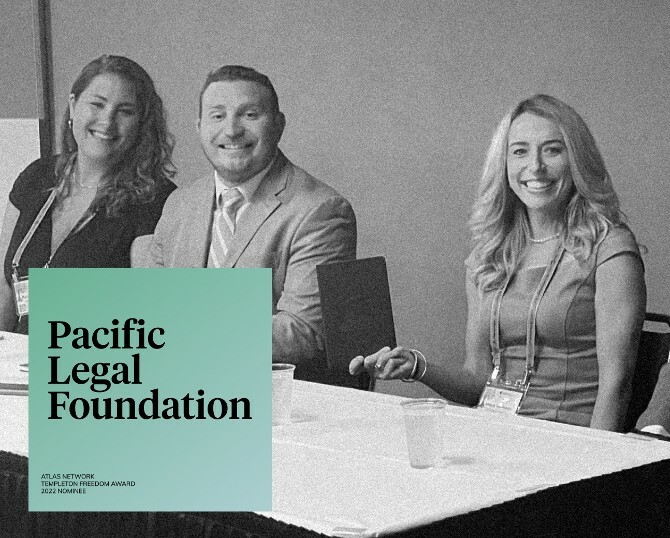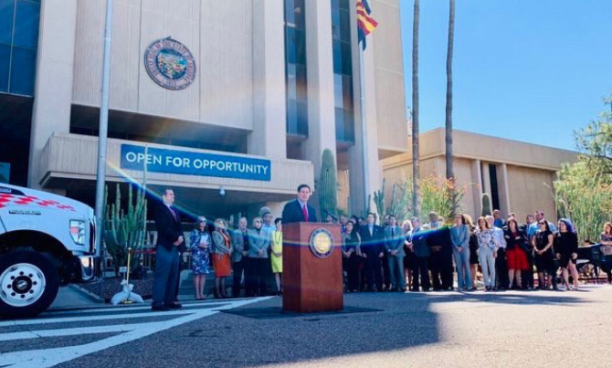
As governors across the United States seized unilateral power and issued emergency declarations months and even years into the COVID-19 pandemic, Pacific Legal Foundation (PLF) and a network of state-based think tanks pushed back. PLF helped draft, advance, and defend legislation limiting gubernatorial power in an emergency. Bills based on their work now require ongoing emergency declarations to be approved by a state’s legislature; other provisions were designed to ensure such declarations offer measured responses to well-defined emergencies and expedite the consideration of legal challenges to executive overreach. So far, 11 states have passed bills based on Pacific Legal Foundation’s work. Their efforts guarantee that governors can effectively respond to emergency situations while curbing their overreach.
“The Templeton Freedom Award is the most prestigious prize in the liberty movement—and being named a finalist is profound validation of the work Pacific Legal Foundation is doing to restore the Constitution’s proper separation of powers between government’s three branches," said Steven D. Anderson, president and CEO of Pacific Legal Foundation. "We’re beyond thrilled to be recognized for our effort as a finalist this year.”
Pacific Legal Foundation’s work to rein in governors’ often dictatorial emergency powers was informed by their understanding of constitutionally defined separation of powers. When the virus first reached U.S. shores, there was a demand for swift action. As the situation continued, however, it became clear that there was room for legislatures to take over and carry out their role as deliberative bodies.
Unfortunately, governors across the United States maintained the position that only they could respond and govern adequately, effectively cutting out an entire branch of government. Pacific Legal Foundation, along with their allies, the American Legislative Exchange Council (ALEC), worked across several fronts to help end executive overreach.
In spring 2020, PLF and ALEC began working together to draft model legislation to provide state legislators with the tools to push back against governors’ repeated emergency declarations and powers. They published the Emergency Powers Limitation Act that fall. As drafted, the act places three key limits on governors’ emergency powers. First, emergency orders automatically expire after a short, defined period of time, requiring a state legislature to approve further orders or extensions. Second, emergency declarations must be focused on achieving a specific health or safety outcome, rather than an open door for inconsistent, illogical, or unproductive limitations on individual freedoms. Finally, it requires courts to expedite their review of challenges to executive orders that restrict constitutionally protected rights.
Throughout 2021, 18 state legislatures proposed bills based on the Emergency Powers Limitation Act or the recommendations therein. Nine states—Florida, Idaho, Kentucky, Montana, North Carolina, North Dakota, Ohio, Pennsylvania, and Utah—ultimately passed and implemented the legislation. They were often hard-fought victories, however. In Pennsylvania, the governor vetoed the bill when it reached his desk, so the legislature sent it to the voters, who approved it as an amendment to the state constitution. In Kentucky, the law was passed over the governor’s veto, and he sued to prevent it from being implemented. As it was an issue of constitutional rights, Pacific Legal Foundation lept into action, filing a lawsuit on behalf of several small breweries and restaurants. The court ruled in favor of freedom in both cases, ending the governor’s attempt to limit his office’s powers and setting an important legal precedent.
Pacific Legal Foundation continued their work this year, and six more states introduced legislation based on the model act. Governors in both Arizona and Virginia have signed the subsequent bills into law.
PLF has been a crucial part of this legislative effort from beginning to end. Not only did they help draft the bill, they worked to popularize it amongst legislators. Their film program highlighted the depth of damage pandemic-related policies were causing to individuals, entrepreneurs, and communities. Their efforts have helped many states ensure that, during the next pandemic, important individual rights will not be so easily trampled.
About Pacific Legal Foundation:
Pacific Legal Foundation is a nonprofit legal organization that defends Americans’ liberties when threatened by government overreach and abuse. Each year, PLF represents hundreds of Americans, free of charge, who seek to improve their lives but are stymied by government. PLF gives them their day in court to vindicate their rights and set a lasting precedent to protect everyone else.
About the Templeton Freedom Award:
Named for the late investor and philanthropist Sir John Templeton, the Templeton Freedom Award has annually honored his legacy. Since 2004, the Award has identified and recognized the most exceptional and innovative contributions to the understanding of free enterprise, and the public policies that encourage prosperity, innovation, and human fulfillment via free competition. The Templeton Freedom Award is generously supported by the Templeton Religion Trust and will be presented during Atlas Network's Freedom Dinner on November 17 in New York City. The winning organization will receive a US$100,000 prize, and all other finalists will receive US$20,000 prizes. Find out more about the award HERE.
See the related articles below to learn more about the other 2022 Templeton Freedom Award finalists.
Related Articles
View All Announcing the 2022 Templeton Freedom Award finalistsThe award is generously supported by Templeton Religion Trust, and is presented live during Atlas Network’s 2022 Liberty Forum & Freedom Dinner in New York City. The winning organization receives a US$100,000 grand prize and the runners-up each receive US$20,000. Atlas Network is excited to announce the following organizations as the finalists of the 2022 Templeton Freedom Award.Read Article
Announcing the 2022 Templeton Freedom Award finalistsThe award is generously supported by Templeton Religion Trust, and is presented live during Atlas Network’s 2022 Liberty Forum & Freedom Dinner in New York City. The winning organization receives a US$100,000 grand prize and the runners-up each receive US$20,000. Atlas Network is excited to announce the following organizations as the finalists of the 2022 Templeton Freedom Award.Read Article- 2022 Templeton Freedom Award Finalist Spotlight: Adam Smith InstituteWhen COVID-19 reached the United Kingdom and the government began to lock down the country, Adam Smith Institute (ASI) mobilized to ensure those lockdown policies were both wise and respectful of human freedom.Read Article
- 2022 Templeton Freedom Award Finalist Spotlight: Advocata InstituteAdvocata Institute spent years seeking to reduce the severity of Sri Lanka’s then looming economic crisis, and the organization gained a reputation as a reliable voice on economic analysis. Now that the crisis has come, food inflation nears 100%, and shortages abound, Advocata continues its efforts to advance sound market-based policy.Read Article
- 2022 Templeton Freedom Award Finalist Spotlight: Foro Regulación InteligenteStifling regulation has long plagued Spain’s Madrid region, and Foro Regulación Inteligente (FRI) is tackling the problem head-on. Their comprehensive efforts have contributed to the repeal of 170 regulatory restrictions, supported the passage of three laws eliminating occupational licensing requirements, and addressed soaring housing costs by removing regulatory barriers to new development.Read Article
- 2022 Templeton Freedom Award Finalist Spotlight: Goldwater InstituteIn the United States, occupational licensing requirements impede or completely prevent many citizens from working in their desired professions. Even when they do satisfy onerous, expensive procedures, these aspiring professionals are often forced to repeat the process if they relocate to a different state. Goldwater Institute’s Breaking Down Barriers to Work initiative pushes for state-based licensing reforms across the country.Read Article
- 2022 Templeton Freedom Award Finalist Spotlight: LivresIn Brazil, anti-competitive practices by state-owned enterprises significantly reduce private investment in the water and sanitation sector, meaning millions of people live their lives next to open sewage and without access to clean water. Backed by Atlas Network partner Livres, the recently passed New Sanitation Framework Bill ends the government’s near monopoly over the sanitation and water treatment sectors and opens them to private investment.Read Article